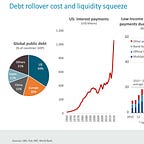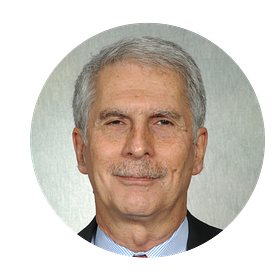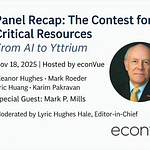76 minutes (with Q&A) ∙ 28 registrants
⮑ Ended WED AUG 28, 2024 5:15 PM CDT (Chicago)
🚫 Q&A session was off the record and is unavailable.A Powell Pivot
On August 28th econVue hosted a panel to analyze the papers presented at Jackson Hole last weekend, and discuss what might happen in mid-September when the Federal Reserve Open Market Committee meets to set interest rates.
Our panelists include Chicago economists and econVue contributors Karim Pakravan and Michael Lewis, along with his colleague Gordon Parrish. They discussed the international implications of a potential shift in monetary policy, and expressed their views on recent US employment figure revisions. I shared some of my impressions of attending previous symposia at Jackson Hole.
If you missed our discussion last Wednesday, we invite you to listen to the opening remarks of our panel as they discuss the Jackson Hole papers and expected changes in the US monetary policy.
My takeaway
After Chairman Powell’s speech at Jackson Hole, there is little doubt that the Federal Reserve will cut 25 bp at their September meeting and that was the consensus of our panel. Lower interest rates and a weaker dollar will be especially beneficial for developing economies with high levels of dollar-denominated debt. But if the dollar weakens too much, that might negate recent gains on inflation. As the 19th century economist Walter Bagehot said, “flaws in the response to financial stability events undermine monetary stability”.
Moreover, inflation that was caused by Covid-related supply shocks could reemerge if geopolitical tensions escalate. As the papers presented at Jackson Hole revealed, this time was different, and recent inflation was also different.
Our panelists were unimpressed with the Fed’s recent forecasting record. Two key concerns emerged. Should the Fed continue to have a dual mandate, price stability and employment, when most other central banks do not? And are Fed communications muddying the waters? Can we find a balance between Alan Greenspan’s “total inscrutability” and Bank of England Governor Andrew Bailey’s call for completely open communications?
I think listeners will gain deep insights from our panelists, who are veteran Fed watchers. Thank you to our panel audience, who contributed so much to the off-the-record discussion as well. Your comments as always are deeply appreciated.
–𝓁𝓎𝓇𝒾𝒸
Editor-in-Chief & Moderator
👥 Panelists
Karim Pakravan
Karim Pakravan is an academic, global finance specialist and consultant in the fields emerging markets, international finance, monetary policy and banking regulation.
📍Chicago
Michael Lewis
Michael Lewis is the founder of FMI. Before founding FMI, Mr. Lewis was an economist at Data Resources, Inc. and Atlantic Richfield Co. He was Chief Economist from 1978 to 1982 at Stein Roe & Farnham. He is kno…
📍Chicago
◻ Discussed on this Panel
Topics
Chairman Powell’s speech at Jackson Hole (Michael Lewis)
Remarks by the Bank of England’s Andrew Bailey (Karim Pakravan)
The viability of the 2% inflation target
The Fed’s dual mandate vs the Taylor Rule
Impact of recent revisions to the BLS jobs report
Communications issues-should the Fed stop talking?
Links: Jackson Hole Presentations
Agenda and presentations for the 2024 Jackson Hole Economic Symposium (Federal Reserve of Kansas City)
Speech by Chairman Jerome Powell at Jackson Hole 🔊 (Federal Reserve Bank)
Reflecting on Recent Times, speech by Andrew Bailey for Jackson Hole (The Bank of England
⧈ Insights
Listen to this episode with a 7-day free trial
Subscribe to econVue to listen to this post and get 7 days of free access to the full post archives.
















